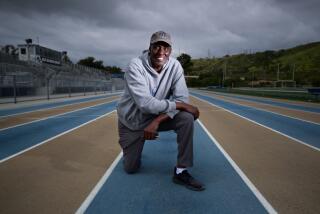Jesse Owens’ exploits still echo at Berlin’s Olympic Stadium
Stephanie Brown Trafton, a young woman of commanding physical stature and Olympic achievement, had a sense of the overwhelming Friday morning as she looked at the austere granite facade of the 1936 Olympic Stadium.
“The first thing I thought of was how intimidating and imposing it was, just the rocks with all the columns,” said Brown Trafton, the 6-foot-4, 225-pound reigning Olympic discus champion. “I imagined how Jesse felt walking into the stadium in a situation where people definitely weren’t rooting for him.”
For Brown Trafton, 28, and the other 135 members of the U.S. team, most of whom were not yet born when Jesse Owens died in 1980, the World Track and Field Championships that begin here today have become an occasion to remember the life of a man many consider the greatest athlete in Olympic history.
This is the first time a U.S. track team has competed at an international event in Berlin since Owens, a black sharecropper’s son, disproved Adolf Hitler’s theory of Aryan superiority by winning four gold medals in the ’36 Games -- an Olympics that Hitler had hoped to use to glorify Nazi ideology.
The stadium underwent a $330-million renovation for the 2006 World Cup, but a visitor approaching it along what is now Jesse-Owens-Allee still gets the same overall impression Owens must have had before winning gold in the 100 and 200 meters, the sprint relay and long jump.
The jump triumph came at the expense of German silver medalist Luz Long, who also defied Hitler by giving Owens critical advice about where to begin his approach.
USA Track & Field has not let the occasion pass without proper recognition. The team uniforms have the initials “JO” above the heart. A U.S. team suggestion led to having Owens’ granddaughter, Marlene Dortch, and Long’s son, Kai, award the medals for the men’s long jump next Friday.
“The ‘JO’ on the uniform lets me know it’s bigger than just me running for myself,” said LaShawn Merritt, 2008 Olympic 400-meter champion. “It’s for my country and the history.”
Merritt’s reaction is exactly what Owens’ granddaughter wanted.
“I’m thankful his legacy and his name lives on,” Dortch said. “I hope that just having his initials on their apparel will inspire some of the athletes to remember this time so many years ago and inspire.”
U.S. men’s head Coach Harvey Glance has emphasized the connection to Owens in team meetings.
“To my surprise, I was very shocked the majority of the team knew the history,” Glance said. “That is how iconic Jesse Owens really was.”
Kenya native Bernard Lagat, a naturalized U.S. citizen and reigning world champion at 1,500 and 5,000 meters, came to a news conference Friday in a sweat shirt adorned with “1936” and a U.S. shield like the one Owens wore on his Olympic singlet.
“Jesse Owens opened a lot of doors not only for U.S. athletes but for the world,” Lagat said. “That is why it is a great message that we are coming here to celebrate his life.”
--
More to Read
Go beyond the scoreboard
Get the latest on L.A.'s teams in the daily Sports Report newsletter.
You may occasionally receive promotional content from the Los Angeles Times.




